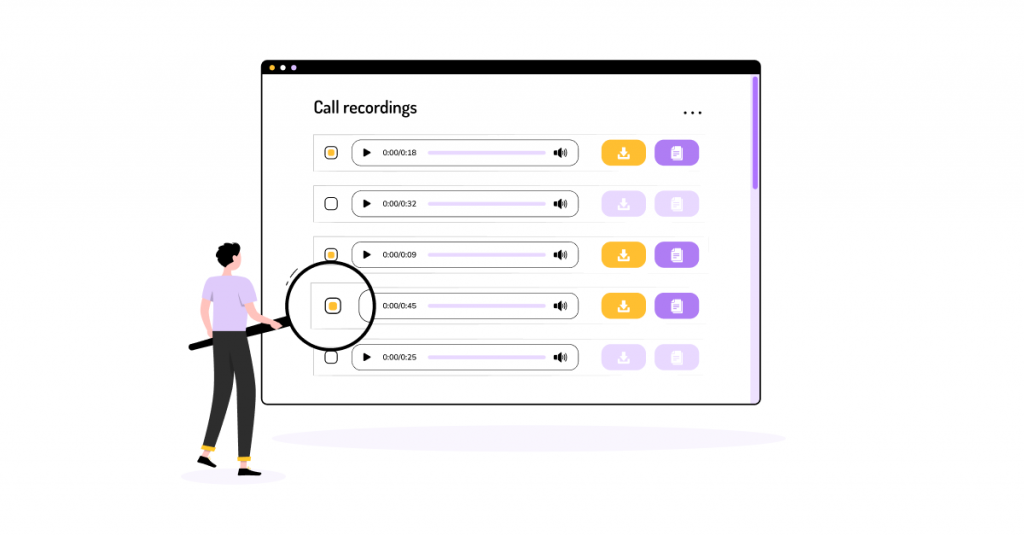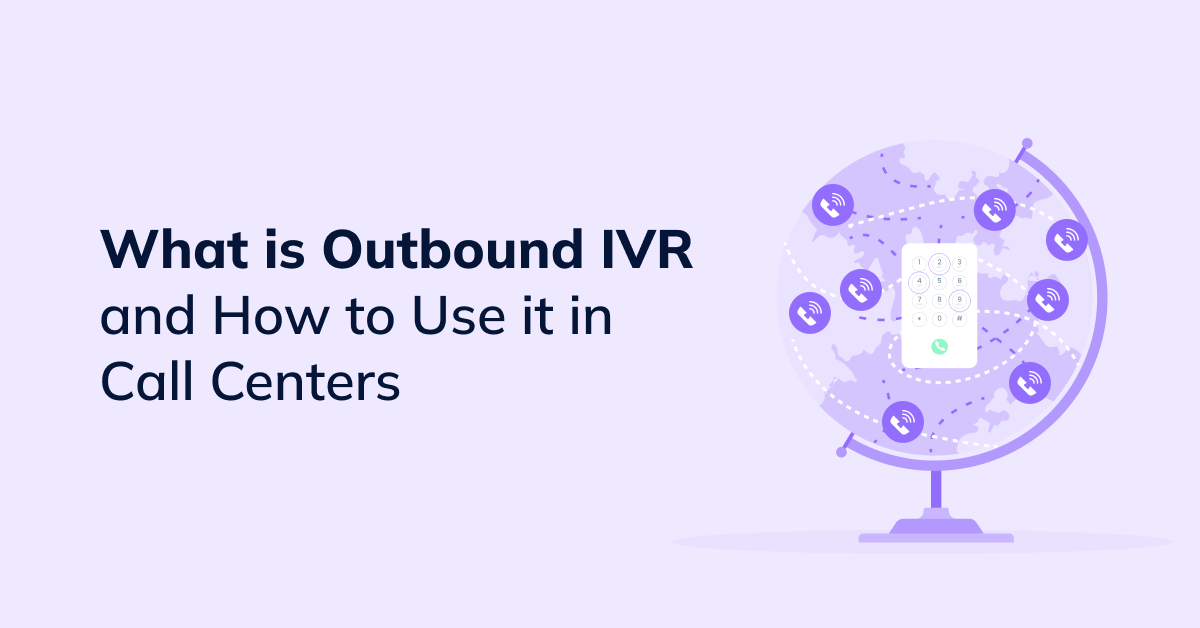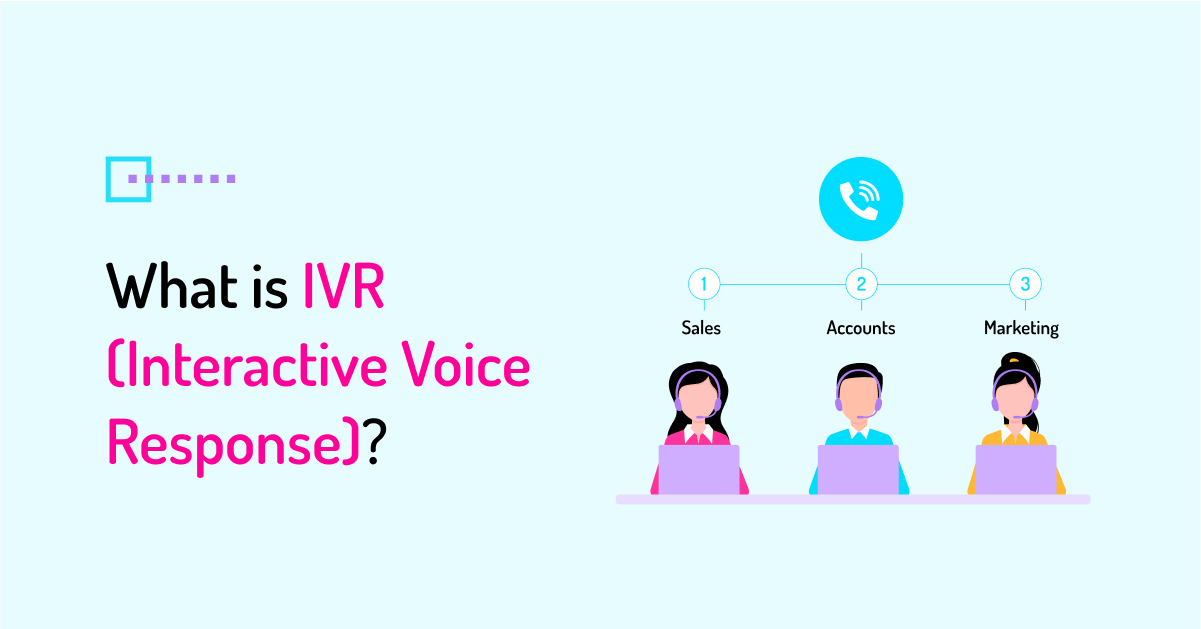Regularly and consistently coaching call center agents is crucial to cultivating and maintaining an efficient team of customer service professionals. When the agents are highly knowledgeable, well-trained, and well-skilled, they are more likely to provide high-quality support and delight customers in every interaction. That can ultimately increase customer satisfaction and improve customer loyalty.
What is Coaching for Call Center Agents?
Call coaching is a common practice in call centers and contact centers that aims at improving the performance and efficiency of call center agents in handling customer interactions over the phone. It involves providing tailored feedback and personalized guidance to agents on how they can improve their call-handling skills, how to deal with different types of callers, how to handle various types of customer issues, and deliver a better customer service experience in each interaction with customers. Call coaching can be conducted in real-time or through a post-call review of call recordings.
The Goal of a Call Center Coaching Manager
The goal of a call center coaching manager is to provide regular coaching sessions to call center employees to ensure they perform at their best while keeping customers satisfied with the level of service provided to them. The first step is identifying specific areas where agents need to improve their skills or expertise through call monitoring. Once the areas of weakness and opportunities for improvement are identified, the coaching manager conducts one-on-one or group coaching sessions to address them. The most essential aspects call center coaching managers should focus on are:
- Extensive product/ service knowledge (to ensure agents can answer versatile questions about the company’s products or services and resolve complicated issues).
- Professional phone etiquette (including how to properly start and end a conversation, how to put a caller on hold, how to transfer and escalate calls, etc.).
- Customer service soft skills (such as active listening, empathy, efficient verbal communication, problem-solving, conflict resolution, and other skills).
Why is Call Coaching Important?

Having regular call coaching sessions is critical to efficient call quality management and ensuring agents are able to maintain the expected level of service delivered to customers. This is especially important during the onboarding stage, helping agents gain more confidence and develop the right skills to provide consistently high customer experience. Some of the specific benefits of call center coaching include:
- Improved agent performance and efficiency: Coaching ensures agents are well-prepared and skilled to efficiently handle any type of inquiry, which results in improved KPIs like reduced Average Handle Times and increased First Call Resolution rates.
- Better call center team collaboration: Group call coaching sessions and peer-to-peer coaching can foster teamwork, lead to better collaboration among team members, and improve interpersonal relationships within the team.
- Enhanced team morale and reduced turnover: A supportive and encouraging coaching environment helps improve team morale and employee engagement, increase job satisfaction, and reduce agent turnover rate.
- Enhanced customer service and experience: Coaching helps agents enhance their soft skills, handle difficult interactions, and defuse customer complaints, which ultimately improves customer satisfaction and customer experience.
- Increased sales and profitability: Developing agents’ sales skills through call center coaching and training can increase sales and improve the overall productivity and efficiency of inbound and outbound call centers.
Call Center Coaching Techniques and Types of Call Coaching
1. Real-time call coaching
With real-time coaching, a coaching manager listens to real-time calls through call monitoring features, which are typically part of call center software tools, and provides immediate guidance and feedback to the agent, helping them handle challenging conversations, resolve customer issues, and deal with complicated customers.
2. Post-call coaching

Post-call coaching is provided to call center agents after the interactions have been completed. As conversation intelligence software usually allows recording, transcribing, and analyzing customer calls, a coaching manager can listen to call recordings or read through call transcripts and deliver feedback to agents based on analytics insights by suggesting ways to improve their skills and call-handling techniques.
3. One-on-one coaching
One-on-one coaching is a personalized coaching session between a coach and a call center rep where the agent is given targeted support and tangible guidance on improving their performance. One-on-one coaching proves to be one of the most effective methods as it provides more confidence and comfort to agents.
4. Group call coaching
In the case of group call coaching, a coach leads a training session with multiple agents and provides feedback and suggestions to the group as a whole instead of focusing on individual reps. It allows creating a collaborative environment where agents can share their experiences and best practices.
5. Peer-to-peer coaching
With peer-to-peer coaching, two or more agents collaborate with each other. They may role-play by acting out specific examples of customer calls to improve their skills, call-handling techniques, and strategies. This way, newly hired agents can efficiently learn from senior, more experienced team members.
Tips for Effective Call Coaching
1. Employ the ‘sandwich’ coaching technique
When coaching call center agents, you shouldn’t only focus on providing negative feedback and pointing out the agents’ weaknesses, poor performance examples, and skill gaps. Instead, you can use a more efficient ‘sandwich’ approach that involves delivering a piece of negative feedback ‘sandwiched’ between two positive ones. Starting and ending a coaching session on a positive note will soften the blow of negative feedback and ensure the session goes smoothly in a comfortable and supportive environment.
2. Practice role-playing coaching
Role-playing is one of the most effective coaching practices, which is often used as part of behavioral coaching in call centers. It allows agents to refine their call-handling skills and behaviors in a safe, low-pressure learning environment.
By having an agent play the role of the customer while a manager plays the role of the agent during role-playing coaching sessions, agents get an opportunity to learn from the manager, which makes it easier to transition new skills and knowledge into practice before employing them in real customer interactions. Role-playing coaching is particularly helpful and efficient during the onboarding process.
3. Encourage agent self-assessment
Encourage agents to review and assess their own performance and behaviors when analyzing calls by having them answer questions like:
- What went well and what went wrong on that call?
- What caused customer frustration during the interaction?
- What could have been improved?
- What would you do differently next time in a similar situation?
Self-assessment helps agents identify their own strengths and weak spots that need improvement, increases motivation and engagement, fosters a sense of responsibility and accountability, and encourages them to take ownership of their own development – all contributing to enhancing the effectiveness of the coaching process.
4. Build a positive learning environment
It’s important for managers to create a positive, supportive environment during the coaching sessions. When agents feel safe, comfortable, and supported, they are more likely to accept constructive feedback and understand that this feedback is aimed at improving their skills and competencies rather than being a personal criticism. It also helps reduce the stress level agents might feel in the process, encourages active participation, and increases engagement.
5. Provide agents with additional resources
Agents’ learning and professional development shouldn’t end with the coaching. Provide agents with additional relevant resources, training materials, and tools they can utilize to support their skill development beyond your coaching sessions. That also supports a culture of continuous development and agent professional growth within a contact center.
How to Implement Call Coaching in Call Center?
Schedule regular coaching sessions

Sessions for coaching agents should be conducted regularly and consistently, as part of a call center’s ongoing agent training process. These could be either group sessions or one-on-one coaching sessions, depending on the preferences and available resources. The key is to have a regular schedule (weekly, bi-weekly, or monthly) and adhere to it. According to a McKinsey survey, there is a direct correlation between how much time supervisors actually spend coaching their agents and agents’ productivity.
Outline goals and objectives
The next important step in call center agent coaching and ensuring its efficiency is setting clear goals and objectives for each coaching session. That could specifically include enhancing the agent’s product knowledge if knowledge gaps were identified, improving the agent’s communication skills, call handling, de-escalation techniques, etc. Having well-defined goals ensures agents stay focused and motivated as they work towards their objectives.
Select calls for coaching
When reviewing call recordings and selecting calls to be analyzed on call coaching sessions, coaching managers should select a mix of representative calls, including both poor interactions and successful ones. Thus, during a call playback, a manager can point out where the interaction went wrong and how it could have been handled better, as well as playback calls from different agents who managed to handle a similar situation more effectively and successfully.
Leverage call center technology
The call coaching process can be significantly streamlined and optimized by leveraging AI call center automation solutions. While reviewing call recordings manually might be a tedious and time-consuming process for managers and supervisors, using advanced speech analytics tools such as VoiceSpin’s AI Speech Analyzer can automate the entire call monitoring process and help managers identify call coaching opportunities.
VoiceSpin’s AI speech analytics software can analyze 100% of your inbound and outbound calls based on your specific requirements, spot specific keywords or key phrases used in conversations, and flag those interactions that require your attention. In addition, the system can automatically generate accurate AI call summaries of every conversation to accelerate your call center QA process.
Call Center Coaching Tools to Improve Your Coaching and Training
Real-time call monitoring
Real-time call monitoring allows call center managers or supervisors to listen in on active customer calls as they are happening and hear first-hand how agents interact with customers or prospects. Since agents aren’t aware of the fact that their calls are being monitored, it allows you to observe their natural behavior, call-handling skills, and ability to navigate complex scenarios. By monitoring calls of lower-performing agents, you can identify specific skill or knowledge gaps and deliver highly targeted coaching to address them.
Live call whispering
With live call whispering (also known as whisper coaching), you can join in on active calls and provide real-time on-call guidance to agents without the person on the other end hearing anything or being aware of your presence. This is particularly helpful during the onboarding process. Whenever newly hired reps struggle during a call, a manager or a supervisor can join in and help them answer a tricky question or handle a complicated issue. It helps new hires gain confidence and master call-handling skills faster.
AI agent assist solutions
AI agent assist solutions (otherwise known as virtual AI agents or AI reply suggestions) are also great call center coaching tools that can help you streamline the onboarding process and get your newly hired agents up to speed faster. These solutions are connected to your internal knowledge sources and act like virtual assistants, helping your reps respond to customers’ questions and resolve issues quickly and efficiently by offering them real-time reply suggestions and recommendations on how to best respond in every possible scenario.
AI call summary
AI call summaries are AI-generated brief recaps of every interaction. They may include key points discussed during the call, resolutions offered, the outcome of the call, next steps to be taken, and other critical details. Being able to access short summaries of every call gives managers and supervisors an opportunity to monitor the quality of interactions and select sample calls that can be used in coaching sessions without having to read the entire transcript of every conversation or listen to call recordings.
AI speech analytics
As already mentioned earlier, AI speech analytics solutions can optimize and enhance the coaching process in call centers. These tools automate the entire call monitoring process and help you assess the quality of conversations and agent performance based on specific metrics and criteria. They can also monitor customer sentiment and track specific keywords and phrases used throughout the conversations. Based on these insights, managers and supervisors can easily identify coachable calls, spot agent knowledge or skill gaps, and refine their coaching practices.
Sentiment analysis
Often part of speech analytics solutions, sentiment analysis tools allow you to track customer sentiment during interactions with your team. They analyze the speaker’s tone of voice, words, pitch variations, intonation, and other variables and then categorize conversations as positive, neutral, or negative. Supervisors and coaches can dig deeper into specific interactions where customers expressed negative sentiments to better understand where agents fail to deliver positive experiences and use these insights to provide targeted coaching.
FAQs
What is a coaching call?
A coaching call is a virtual coaching session between a call center coach and a call center representative (usually working at a remote location) conducted to enhance the rep’s skills and improve their call-handling techniques and performance. Regular coaching calls are essential to ensuring remote agents get the same level of support and assistance as their peers working in an office environment.
What are group coaching calls?
In the call center context, a group coaching call is a virtual coaching session between a coach and a group of call center agents. These calls provide the opportunity for the agents to develop new skills and enhance their knowledge, which will help them efficiently handle customer interactions, show outstanding performance, and deliver a consistent customer service experience.





 +18889082995
+18889082995
 +442036084160
+442036084160
 +97237237006
+97237237006